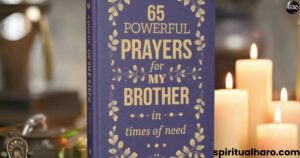Understanding the Characteristics of Brokenness is a vital step in spiritual growth. Brokenness is not merely a state of feeling lost or defeated; it is an invitation to humble ourselves and embrace God’s refining process. When we acknowledge our brokenness, we open our hearts to repentance, healing, and deeper intimacy with God. It’s through these moments of vulnerability that we are reminded of our need for His grace and strength.
The Characteristics of Brokenness reveal essential qualities such as humility, dependence on God, and a willingness to submit to His will. Embracing these traits helps us build resilience, trust, and hope during times of struggle. As we lean into God’s love and mercy, our brokenness becomes a powerful catalyst for spiritual transformation. Ultimately, it leads to restoration, allowing us to experience God’s healing power and emerge stronger in faith.
9 Characteristics of Brokenness
1. Humble Spirit
A humble spirit is a central aspect of the Characteristics of Brokenness, and it is the foundation upon which all other aspects of spiritual growth rest. It involves surrendering ourselves to God’s will, trusting that His plan is better than our own, especially when facing trials and suffering. Humility is not about feeling inferior or self deprecating, but it’s about acknowledging that we are entirely dependent on God’s grace, mercy, and wisdom. When we are broken, we come to understand that we are powerless without Him, and it is this awareness that allows us to grow spiritually.
King David exemplifies the importance of a humble spirit in his repentance after committing grievous sins, including adultery with Bathsheba and orchestrating the death of her husband. In Psalm 51:17, David writes, “The sacrifices of God are a broken spirit: a broken and a contrite heart, O God, thou wilt not despise.” David’s words show us that a humble spirit one that acknowledges its brokenness and seeks God’s forgiveness is deeply pleasing to God. David’s brokenness before the Lord wasn’t just about admitting guilt; it was a sincere recognition of his need for God’s grace to heal and restore him. His humility opened the door for reconciliation with God, proving that Characteristics of Brokenness like a humble spirit are key to a deeper relationship with Him.
2. Repentance and Confession

Repentance and confession are transformative Characteristics of Brokenness that play a crucial role in our journey toward spiritual renewal. Repentance is the act of turning away from sin and making a conscious decision to align ourselves with God’s will. Confession, on the other hand, is the act of acknowledging our sins before God, opening ourselves to His forgiveness and mercy. Together, repentance and confession bring us closer to God and help us overcome the separation caused by sin.
In Psalm 51, King David’s heartfelt repentance becomes a powerful example for us. After being confronted by the prophet Nathan, David acknowledged his sin without excuses, fully admitting that he had wronged both God and those around him. He pleaded for God’s mercy, saying, “Create in me a clean heart, O God, and renew a right spirit within me.” This prayer reflects true repentance David didn’t just want to be forgiven; he wanted to be transformed. Similarly, the story of the prodigal son in Luke 15:21 provides another compelling example of repentance and confession. The son returns to his father after squandering his inheritance and admits, “Father, I have sinned against heaven and in thy sight, and am no more worthy to be called thy son.” His humble confession is met with forgiveness, demonstrating how repentance and confession are Characteristics of Brokenness that lead to restoration and healing. True repentance brings peace, and the act of confessing our sins allows us to experience God’s grace, making it a fundamental part of the process of healing in brokenness.
3. Dependence on God
Dependence on God is perhaps one of the most vital Characteristics of Brokenness, as it highlights our need for God’s help, direction, and strength. In brokenness, we learn that we are incapable of achieving true peace, healing, or righteousness on our own. God is the source of all things, our strength, wisdom, and joy and in times of brokenness, we are reminded that our life and success are entirely dependent on Him. By acknowledging our weaknesses and limitations, we open ourselves to receive His abundant grace and power.
In 2 Corinthians 12:9, the Apostle Paul shares his own experience with God’s sufficiency in weakness. He writes, “But he said to me, ‘My grace is sufficient for you, for my power is made perfect in weakness.’” Paul’s acknowledgment of his own weakness led him to experience the fullness of God’s strength. This scripture emphasizes how dependence on God is one of the key Characteristics of Brokenness. When we let go of our self sufficiency and trust in God’s power, we become vessels for His strength and grace to work through us. It is often in our brokenness that we realize how desperately we need God. When we humble ourselves, turn to Him in repentance, and depend on His strength, we experience a level of intimacy with Him that would not be possible otherwise.
4. Seeking Healing and Restoration
Seeking healing and restoration is a fundamental Characteristic of Brokenness as it speaks to the deep desire to be made whole after experiencing pain, loss, or spiritual brokenness. Brokenness, often brought on by personal struggles, sin, or grief, leaves a mark on the soul, making healing a vital process for restoration. God, in His mercy, offers not only the promise of forgiveness but also the opportunity for complete healing of our hearts and spirits. This is where restoration comes in. God longs to restore what was lost and bring peace where there was once turmoil.
The Bible encourages us that God does not leave us in our brokenness but actively works to heal and restore us. In Psalm 147:3, we are reminded that “He heals the brokenhearted and binds up their wounds.” Restoration is a process that requires faith and trust in God’s timing. We may seek physical healing, emotional restoration, or the healing of fractured relationships, but ultimately, the goal is to align ourselves with God’s will for complete wholeness. Seeking healing involves turning to God in prayer, acknowledging our pain, and being open to the ways He works through His Word, the Holy Spirit, and the support of fellow believers. The story of the woman with the issue of blood (Mark 5:34) highlights that when we approach Jesus in faith, He responds with healing and restoration. Seeking Healing and Restoration invites us to rely on God’s unfailing love to repair what is broken in our lives.
Related Guide:
19 Powerful Prayers for Strength After a Breakup
5. Endurance and Perseverance
Endurance and perseverance are powerful Characteristics of Brokenness that empower us to remain faithful through trials and hardships. In moments of brokenness, life can feel overwhelming, and the weight of our struggles can seem unbearable. However, it is during these times that God invites us to endure with patience, trusting in His ability to bring us through. Endurance does not mean the absence of pain but the ability to stand firm in the face of challenges, knowing that God is with us. Perseverance, on the other hand, is the strength to continue pressing forward despite obstacles or setbacks. Together, they shape our character and deepen our relationship with God, teaching us that our trials are not meaningless but are used by God for our growth.
The apostle James encourages us in James 1:12, saying, “Blessed is the one who perseveres under trial because, having stood the test, that person will receive the crown of life that the Lord has promised to those who love him.” This verse assures us that our endurance is not in vain. Each trial we face provides an opportunity for spiritual growth and a closer connection with God. Jesus also spoke about perseverance in Matthew 17:20, where He compared faith to a mustard seed, emphasizing that even a small amount of faith can move mountains. In the same way, Endurance and Perseverance during brokenness can lead to miraculous breakthroughs, allowing us to experience God’s power and faithfulness even in our most difficult moments. Enduring in faith through brokenness helps refine us, ultimately leading us to a deeper trust in God’s sovereign will and an unwavering hope in His promises.
6. Surrendering to God’s Will
Surrendering to God’s will is one of the most powerful Characteristics of Brokenness, as it involves letting go of our own desires, fears, and plans, and fully submitting to the will of God, trusting that He knows what is best for us. Brokenness often brings us to the realization that we cannot control every aspect of our lives, and in those moments of surrender, we acknowledge that God is in charge. It requires humility and obedience, and it is an act of faith to trust that God’s purposes will bring greater good, even in the midst of suffering. Surrendering to God’s will is not always easy; it may involve laying down our personal ambitions, navigating uncertainty, and allowing God to lead us into unfamiliar territory. However, it is the pathway to spiritual peace and growth.
Jesus’ prayer in the Garden of Gethsemane offers the ultimate example of surrender. In Matthew 26:39, He prayed, “My Father, if it is possible, may this cup be taken from me. Yet not as I will, but as you will.” Even in the face of immense suffering, Jesus surrendered to the Father’s will, demonstrating perfect submission. His obedience led to the salvation of the world. Surrendering to God’s will in brokenness requires faith in His goodness and trust in His plans. It also invites us into a deeper relationship with Him, as we learn to rely on His strength rather than our own. By surrendering, we acknowledge that God’s will is greater than our own and that His plan for us is filled with hope and purpose, even in the midst of our brokenness. Surrendering to God’s Will allows us to experience the peace that surpasses understanding, knowing that God is working all things for our good and His glory.
7. Trusting God’s Plan
Trusting God’s Plan is a deeply significant Characteristic of Brokenness, as it requires total surrender to God’s will, especially during challenging times. When we face brokenness, whether it’s the result of personal failure, betrayal, loss, or unmet desires, our natural response may be to question God’s intentions or feel lost in the midst of our pain. However, trusting God’s plan involves embracing the belief that God is always in control, even when life feels uncertain and unpredictable. We are reminded that His wisdom far exceeds ours, and His plans for us are filled with hope and promise.
Scripture reassures us that God has a purpose for our lives, even in moments of despair. Jeremiah 29:11 offers comforting words, declaring, “For I know the plans I have for you, declares the Lord, plans for welfare and not for evil, to give you a future and a hope.” This passage reminds us that God’s plans are intended to benefit us, even when we cannot see the full picture. Trusting God’s plan means knowing that our experiences, both good and bad, are used by God to shape us into who He wants us to be. The story of Joseph, as mentioned in Genesis 50:20, beautifully illustrates this trust when he forgives his brothers for their betrayal and acknowledges that although they meant harm, God used the situation for a greater good: “You intended to harm me, but God intended it for good to accomplish what is now being done, the saving of many lives.” By trusting God’s plan, we allow Him to guide us through our brokenness, knowing that He will lead us to a place of restoration and purpose.
8. Finding Strength in Weakness
Finding Strength in Weakness is one of the most profound Characteristics of Brokenness. The concept is paradoxical our natural instinct is to resist weakness, yet God’s Word teaches us that in our weakness, we experience His power in a profound way. When we go through periods of brokenness, whether physically, emotionally, or spiritually, we may feel weak, vulnerable, or defeated. However, brokenness becomes an opportunity for us to rely on God’s strength rather than our own. The Bible teaches that it is in our weakest moments that God’s strength shines the brightest.
2 Corinthians 12:9 offers a powerful truth that encourages us to find peace in our struggles: “But he said to me, ‘My grace is sufficient for you, for my power is made perfect in weakness.’ Therefore I will boast all the more gladly of my weaknesses, so that the power of Christ may rest upon me.” Apostle Paul’s revelation is a reminder that in our weaknesses, we are not abandoned; instead, we become vessels for God’s strength. Finding Strength in Weakness involves shifting our focus from self-reliance to God-reliance, acknowledging that only through His grace can we endure and overcome. When we embrace our limitations, God empowers us to rise above them, giving us a strength that is beyond our natural abilities. Whether we’re enduring a season of grief, hardship, or personal failure, God’s grace sustains us. By trusting in Him, we allow His power to transform our weaknesses into testimonies of His greatness.
9. Forgiveness and Reconciliation

Forgiveness and Reconciliation are central Characteristics of Brokenness, as they represent the transformative power of healing relationships both with God and others. When we experience brokenness due to sin, betrayal, or conflict, it can create a deep sense of hurt and division in our lives. However, the Bible teaches that forgiveness is essential to healing. Holding onto anger, bitterness, or resentment only deepens our brokenness. On the other hand, forgiveness and reconciliation allow us to experience the freedom and peace that come from releasing grudges and embracing God’s grace.
In Matthew 6:14-15, Jesus underscores the importance of forgiveness: “For if you forgive other people when they sin against you, your heavenly Father will also forgive you. But if you do not forgive others their sins, your Father will not forgive your sins.” This is a clear reminder that forgiveness is not optional it is a command from God that enables us to receive the same mercy that we extend to others. Forgiveness and Reconciliation are not just about healing relationships with others but are also vital to restoring our relationship with God. Just as God forgives us for our sins, we are called to forgive those who hurt us, regardless of the severity of the offense. Jesus is our ultimate example of forgiveness, particularly in His final moments on the cross, when He prayed for His enemies: “Father, forgive them, for they do not know what they are doing” (Luke 23:34).
Reconciliation is the next step in the process of healing. It goes beyond forgiveness and involves the restoration of relationships, which requires effort, humility, and mutual understanding. In Colossians 3:13-14, Paul urges believers to forgive each other and live in harmony, saying, “Bear with each other and forgive one another if any of you has a grievance against someone. Forgive as the Lord forgave you. And over all these virtues put on love, which binds them all together in perfect unity.” Reconciliation, therefore, is about building bridges, not walls, and restoring unity where there has been division. Through forgiveness and reconciliation, brokenness is healed, relationships are restored, and God’s love is made evident to the world.
FAQ’s
What are the characteristics of brokenness?
The Characteristics of Brokenness include humility, repentance, dependence on God, and seeking healing and restoration through faith.
What are the characteristics of a broken soul?
A broken soul exhibits deep humility, a contrite heart, and a sincere desire for spiritual renewal and reconciliation with God.
What are the signs of spiritual brokenness?
Signs of spiritual brokenness include a contrite spirit, repentance, deep sorrow for sin, and a longing to draw closer to God.
What are the types of brokenness?
The Characteristics of Brokenness manifest in emotional, spiritual, and relational types, each leading to a deeper dependence on God for healing.
How to heal brokenness?
Healing from brokenness involves repentance, seeking God’s forgiveness, trusting in His plan, and allowing His grace to restore you.
Conclusion
The Characteristics of Brokenness are not a sign of weakness but a powerful step towards spiritual growth and restoration. Through humility, repentance, and surrendering to God’s will, brokenness becomes a pathway to healing. A broken heart and contrite spirit allow for deep spiritual transformation, drawing us closer to God’s love and grace. By embracing the process of brokenness, we are given the opportunity to experience God’s restorative power and the beauty of spiritual renewal.
Furthermore, spiritual brokenness is not something to be feared but a necessary part of our journey of faith. It teaches us to trust in God’s plan and find strength in our weakness. Through this process, we can be reconciled to God, healing our hearts and restoring our souls. Ultimately, brokenness leads to greater intimacy with God, a stronger faith, and a renewed sense of purpose.

With five years of experience as a content writer, I specialize in creating engaging website content that drives traffic and builds brand loyalty. My expertise lies in crafting clear, compelling narratives that connect with audiences and optimize for search engines. I’m passionate about helping businesses articulate their unique value through well-researched blog posts, persuasive web copy, and impactful social media content. My goal is to transform ideas into captivating stories that not only inform but also inspire action.







